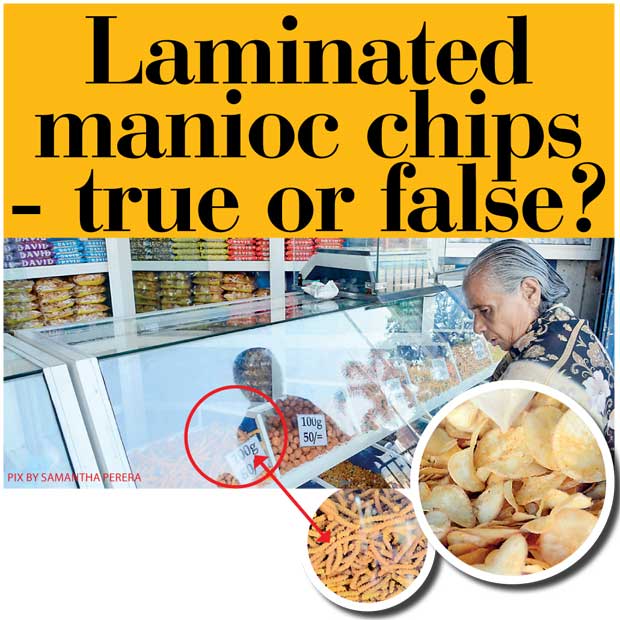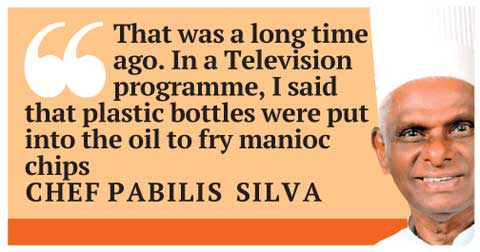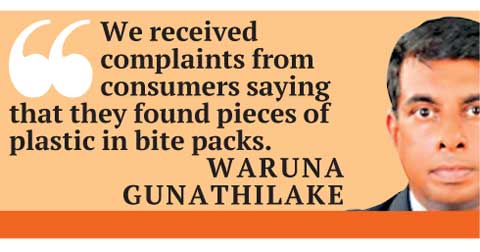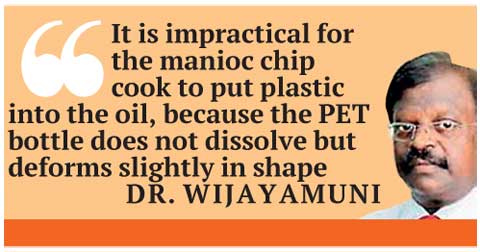Reply To:
Name - Reply Comment
Last Updated : 2024-04-19 19:28:00

By Amra Ismail and Yasu-e Karunaratne
A rumour that has been used by teachers to wake up the back rows of classes. A rumour that has been discussed at length in offices whenever someone brought a pack of chips to share. We may believe that in spreading this rumour we are creating awareness and protecting our fellow citizens. However, none of us has cold hard evidence to prove it. Not even the CMC, Consumer Affairs Authority (CAA) or technological institutes such as the ITI (Industry Technology Institute) and the IDB (Industrial Development Board) have found scientific evidence to prove this contention. But there are many repercussions that the people in the bites industry have to bear due to these allegations . Widanagamage, the President of the Bites and Sweets Manufacturing Society of Sri Lanka under which 45 companies function, said: “Plastic bottles melt at a temperature of 260 °C. Bites and manioc chips are fried at a temperature between 170°C and 180°C. By the time the plastic melts and starts entering the chips or bites, it would have blackened and become inedible. This shows that it is scientifically impossible to use plastic as a hardening agent.”
Dr. Varuna Gunathilake, head of the Toxicology and National Poisons Information Centre said: “We received complaints from consumers saying that they found pieces of plastic in bite packs.”
A CAA spokesman said, “The CAA visited several places where these manioc chips were being packed. We could not find anything to prove this rumour.” When the CMC Chief Medical Officer Dr. Wijayamuni was asked about this he said : “It is impractical for the manioc chip cook to put plastic into the oil, because the PET bottle does not dissolve but deforms slightly in shape. We also had a meeting with the Public Health Department of the CMC, where we told the city analyst of Colombo Gamini Rajanayake to conduct experiments to prove if this rumour was fact or fiction.” Mr. Rajanayake conducted the following experiment and found some surprising results. “The rumour is rather simple, a handful of people believe that frying the chip with pieces of PET bottles will make the plastic dissolve due to the heat and eventually create a coating or film that laminates the chip that makes it last longer,” Mr. Rajanayake said. “ However after conducting the experiment to test this hypothesis we found the rumor of laminated chips to be untrue. The experiment was as follows- we first fried chips in normal conditions, without adding plastic. Secondly, we fried the chips with pieces of a PET bottle. We found there wasn’t a difference between the chips in the two experiments, with regards to texture and quality. The only difference was that the pieces of PET bottle that were put into the oil changed colour, from blue to green. This can be due to the fact that there is carotene in the oil which is a yellow pigment. Hence, it is completely useless to put plastic into the oil while frying chips as it does not create a film that laminates the chip that helps it last longer. This rumour is false and  unfair on the people who have to bear the costs due to it.”
unfair on the people who have to bear the costs due to it.”
Dr. Iresha Mendis, President of the Department of the Food Science and Technology said: “This allegation is not true. There is no evidence to prove it. Experiments have been conducted by the city analyst Gamini Rajanayake, and there is no evidence to confirm this allegation.”
“There is a possibility that multi- national companies spread this rumour so as to increase their revenue and tarnish the reputation of the domestic food and bites industries here. However, if a handful of vendors do believe this rumour and use plastic, believing that it would make it last longer, this could be harmful to consumers. Though the PET bottle does not dissolve, there is a possibility that harmful chemicals such as the monomer Terephthalic acid could seep into the chips. However, the oil has to reach temperatures up to 300°C for this chemical to seep out. Though the chemical will seep out that temperature the chip would burn and be inedible. Our country also does not have the machinery and technology to identify the exact chemical bonds in the manioc chip. The lack of advanced machinery is another problem we have identified considering this issue.” Mr. Rajanayake added.
He asked Mr. Rajanayake what he believed to be a solution for this predicament. “We should have awareness programmes where we advise people that it is useless to use plastic when frying chips as it does not benefit the public or the vendor.” Dr. Mendis added. “Various newspapers and other electronic media have propagated this false rumour. Chef Pabilis, in a television programme publicly stated that plastic is added into manioc chips. When we interrogated him he failed to provide us with either the names of the people involved or places where it happened,” said Mr. Widanagamage. Speaking to Daily Mirror Pabilis said: “That was a long time ago. In a Television programme, I said that plastic bottles were put into the oil to fry manioc chips. Around a week later, three manufacturers met me and asked whether I wanted to ruin their livelihood and families. They requested me to clear the situation because they said they did not add plastic. But I refused to do so. I asked them to clear the situation themselves if they were not involved in this racket.”
“A man working in such a place informed me about this,” added Chef Pablis. Yet he refused to provide the address or the names of the people involved in this racket. “I have been working in this field for over 60 years. When we fry some potato the crispiness is never retained for weeks. These manioc chips retain their crispness not just for months but even for a whole year. If no toxic chemicals are added, then how is this possible? Even after this was publicly stated the Health Ministry has not done any investigations. They could get samples and test. Today to all types of food chemicals are added. No one is talking against them.” When asked about how the crispness is retained for weeks Mr. Widanagamage said: “There is a particular temperature at which these chips and bites are fried. This temperature is unique and is a secret. This is why you cannot expect these results when you prepare them at home. We have certain equipment to maintain this stable temperature. It is also the experience and talent of the cook that helps retain the crispness as well as the quality of what we prepare.” He further stated that no other chemical was added to prolong the crispness of bites and chips. Referring to measures, the Bites Society has taken steps to prove these allegations are false, Mr. Widanagamage said: “We made a complaint to the IDB. But they said that they did not have the facilities to conduct experiments.”
Acting Director of the Technical Services of the Industrial Development Board Mohan Gunasinghe affirming the statement made by Mr. Widanagamage said: “We do not have facilities to carry on testing regarding this. A food testing lab is being installed and it would be complete by next year.” A spokesman of the Industrial Technology Institute said: “We are not a regulatory authority. There is no mandate to do this. As far as I know, we have not done anything with regards to this. But if there are any requests we could look into it. But the issue has neither been raised to a level so that we could get involved nor have any requests been made.” Referring to who should be responsible to carry out investigations, the spokesman said: “The Food Control Unit and the PHIs under the Health Ministry as well as the CAA are the regulatory authorities who should be looking into this. They have the power to investigate and bring the culprits to court and penalize them. We will support them technically in their research. We have the technology to do so though some developments would have to be done in this regard.” He added that samples provided by consumers could also be checked for a particular sum of money.
Mr. Widanagamage further added that there was a complete change in their lifestyle after the spread of this rumour. “There was a collapse in our sales. Previously we used to manufacture around 1000 kg of manioc chips a day in 35 places. Now this amount has decreased them to 1000 kg per week. If the amount sold in one outlet had been around 2 or 3 kg daily, now we don’t even succeed in selling that amount in a week,” said Mr. Widanagamage. Referring to the workforce, Mr. Widanagamage noted: “We have not been able to pay salaries. due to EPF regularities, we cannot send our workers away. We used to do everything in a very organized manner, but today there is much uncertainty due to these false allegations.” The manager of “David Gram Stores”, Karthika Kumar (28) said “We have 26 outlets around Colombo and the suburbs and it is solely our company that makes our bites . Our stores and kitchen are in Dematagoda and our bites are made there. Even if you visit at any time, I can assure you none of our cooks uses plastic. Yes, I have heard this rumour, but it is untrue as far as our company is concerned.” Ranjith Munasinghe, 50, from Gampaha said, “of course they add plastic bottles. I only buy peanuts and never manioc chips.” He is one of many who are convinced of the veracity of this rumour. Sarath Kumara, 48 from Delgoda said “Maybe it is true and maybe not, though it is likely to be true.” The colleagues in the office look at each other and the packet of manioc chips on the table. Someone asks, “How do you know?” Another replies, “I heard it.” Someone else says, “I saw it.” These are all endless possibilities that could neither “prove” nor “clear” this rumour. The children in the back row demand proof. And certainly we do too. Yet does the lack of concrete evidence falsify this rumour?
Mohamed Iqbal Wednesday, 06 April 2016 12:35 PM
Very good investigation on this subject. We Sri Lankans are an educated society but still we go behind rumors. The producers should take their points to public against this rumour.

Add comment
Comments will be edited (grammar, spelling and slang) and authorized at the discretion of Daily Mirror online. The website also has the right not to publish selected comments.
Reply To:
Name - Reply Comment
On March 26, a couple arriving from Thailand was arrested with 88 live animal
According to villagers from Naula-Moragolla out of 105 families 80 can afford
Is the situation in Sri Lanka so grim that locals harbour hope that they coul
A recent post on social media revealed that three purple-faced langurs near t